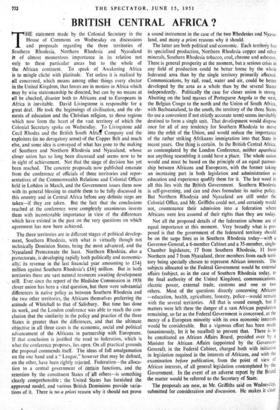BRITISH CENTRAL AFRICA ?
THE statement made by the Colonial Secretary in the House of Commons on Wednesday on discussions and proposals regarding the three territories of Southern Rhodesia, Northern Rhodesia and Nyasaland is of almost momentous importance in its relation not only to these particular areas but to the whole of the African continent. To speak of Awakening Africa is to mingle cliché with 'platitude. Yet unless it is realised by all concerned, which means among other things every elector in the United Kingdom, that forces are in motion in Africa which may by wise statesmanship be directed, but can by no means at all be checked, disaster both to Africans and to Europeans in Africa is inevitable. David Livingstone is responsible for a great deal. He took the beginnings of civilisation, and the ele- ments of education and the Christian religion, to those regions which now form the heart of the vast territory of which the Colonial Secretary spoke on Wednesday. To Livingstone add Cecil Rhodes and the British South Africk Company and the exploiters (in no derogatory sense) of the Copper Belt and much else, and some idea is conveyed of what has gone to the making of Southern and Northern Rhodesia and Nyasaland, whose closer union has so long been discussed and seems now to be in sight of achievement. Not that the stage of decision has yet been reached. The concrete proposals now published emanate from the conference of officials of three territories and repre- sentatives of the Commonwealth Relations and Colonial Offices held in Lohdon in March, and the Government issues them now with its general blessing to enable them to be fully discussed in this country and in Central Africa before any definite steps are taken—if they are taken. But the fact that the conclusions reached at the conference were completely unanimous invests them with incontestable importance in view of the differences which have existed in the past on the very queitions on which agreement has now been achieved.
The three territories are in different stages of political develop- ment, Southern Rhodesia, with what is virtually though not technically Dominion Status, being the most advanced, and the Nyasaland Protectorate the least. Northern Rhodesia, also a protectorate, is developing rapidly both politically and economic- ally: its revenue in the last financial year amounting to flilf million against Southern Rhodesia's £161 million. But in both territories there are vast natural resources awaiting development still. Ever since the report of the Bledisloe Commission in 1938 closer union has been a vital question, but there were substantial differences in native policy as between Southern Rhodesia and the two other territories, the Africans themselves preferring the attitude of Whitehall to that of Salisbury. But time has done its work, and the London conference was able to reach the con- clusion that the similarity in the policy and practice of the three States is greater than the differences, and that the ultimate objective in all three cases is the economic, social and political advancement of the Africans in partnership with Europeans. if that conclusion is justified the road to federation, which is what the conference proposes. lies open. On all practical grounds the proposal commends itself. The ideas of full amalgamation on the one hand and a " League," however that may be defined, on the other, have been rightly rejected. Federation—the alloca- tion to a central government of certain functions, and the retention by the constituent States of all others—is something clearly comprehensible : the United States has furnished the approved model, and various British Dominions provide varia- tions of it. There is no a priori reason why it should not prove a sound instrument in the case of the two Rhodesias and Nyasa- land, and many a priori reasons why it should.
The latter are both political and economic. Each territory has its specialised production, Northern Rhodesia copper and other minerals, Southern Rhodesia tobacco, coal, chrome and asbestos. There is general prosperity at the moment, but a serious crisis in any field of production could be better borne by the whole federated area than by the single territory primarily affected. Communications, by rail, road, water and air, could be better developed by the area as a whole than by the several States independently. Politically the case for closer union is strong. Abutting on the land masses of Portuguese Angola to the west, the Belgian Congo to the north and the Union of South Africa, with Bechuanaland, to the south, the territory of the three States (to use a convenient if not strictly accurate term) seems inevitably destined to form a single unit. That development would dispose once for all of any tendency for Southern Rhodesia to move ihto the orbit of the Union, and would reduce the importance of the rather striking Afrikaans immigration into that State in recent years. One thing is certain. In the British Central Africa, as contemplated by the London Conference, neither apartheid nor anything resembling it could have a place. The whole union would and must be based on the principle of an equal partner. ship between Africans and Europeans, with the former taking an increasing part in both legislation and administration as education and experience qualify them for it. The last word in all this lies with the British Government. Southern Rhodesia is self-governing, and can and does formulate its native policy. But Northern Rhodesia and Nyasaland are still under the Colonial Office, and Mr. Griffiths could not, and certainly would not, countenance their admission into a federation where Africans were less assured of their rights than they are today.
Not all the proposed details of the federation scheme are of equal importance at this moment. Very broadly what is pro- posed is that the government of the federated territory should be on the sarpe lines as in Southern Rhodesia today—with a Governor-General, a 6-member Cabinet and a 35-member, single- Chamber legislature, 17 from Southern Rhodesia, 11 from Northern and 7 from Nyasaland, three members from each terri- tory being specially chosen to represent African interests. The subjects allocated to the Federal Government would be external affairs (subject, as in the case of Southern Rhodesia today, to the final authority of the United Kingdom), communications. electric power, external trade, customs and one or two others. Most of the questions directly concerning Africans —education, health, agriculture, forestry, police—would remain with the several territories. All that is sound enough, but if matters were left there the danger of a vast. African population remaining, so far as the Federal Government is concerned, at the mercy of a European minority with its own economic interests would be considerable. But a vigorous effort has been made (unanimously, let it be recalled) to prevent that. There is to be constituted an African Affairs Board, presided over by a Minister for African. Affairs (appointed by the Governor- General), in the Federal Cabinet, charged both with initiathe in legislation required in the interests of Africans, and with the examination before publication, from the point of view of African interests, of all general legislation contemplated by the Government. In the event of an adverse report by the Board the matter would be referred to the Secretary of State.
The proposals are now, as Mr. Griffiths said on Wednesday, submitted for consideration and discussion. He makes it clear that the Government is favourably disposed to them as a whole, and has indicated That when adequate time has elapsed he and the Secretary for Commonwealth Relations (within whose juris- diction Southern Rhodesia falls) will visit the Central African territories and confer with representatives of all three of them. That. is a wise and promising procedure. But no plans for federation are worth pursuing unless the principle of progress— meaning the progress of Africans to the management of their own affairs—is ungrudgingly recognised. There is no question of the premature attainment of the goal. and its attainment is perfectly compatible with a continuing and increasingly cordial partnership with Europeans. There are dangers in going too fast as well as in going too slowly. The only fatal danger would be to attempt to stand still. The report now issued represents essentially ordered progress. Humanity, said a great African, has struck its tents and is on the march. That is happening to Africa itself today, and to refuse to recognise it would be much worse than folly.



































 Previous page
Previous page